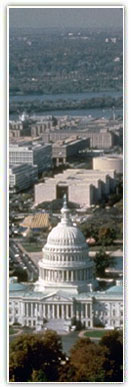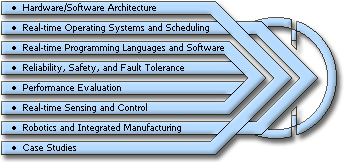 Ph.D. Student Forum on Cyber-Physical Systems -- December 1, 2009 Ph.D. Student Forum on Cyber-Physical Systems -- December 1, 2009
Cyber-physical systems (CPS) are characterized by extremely tight integration of and coordination between computational and physical resources. CPS integrate computation, communication, and storage capabilities through systems of systems that must interact with the physical world in real-time at multiple time scales and often at multiple spatial scales. The inherent heterogeneity and the non-deterministic operation of different components in these systems pose new challenges to traditional control, communication, real-time scheduling, and robotics disciplines. Thus, new approaches, theoretical foundations, and systems support are needed to solve the more complicated aggregate systems that will arise in this context.
 Schedule Schedule
| 7:30-8:30 AM |
Morning coffee, bagels and juice |
| 8:30-8:40 |
Opening remarks |
| Morning Talks |
| 8:40-9:00 |
Tron Roberto |
Consensus Algorithms for Camera Sensor Networks |
| 9:00-9:20 |
Jia Zou |
A Programming Model for Cyber-physical Systems |
| 9:20-9:40 |
Chris Zimmer |
Fault Tolerant Network Routing through Software Overlays for Intelligent Power Grids |
| 9:40-10:00 |
Taylor Johnson |
Handling Failures in Cyber-Physical Systems: Potential Directions |
| 10:00-10:40 |
Mid-morning coffee |
| 10:40-11:00 |
Terry Tidwell |
Scheduling Design for Open Soft Real-Time Systems using Time-Utility Functions |
| 11:00-11:20 |
Neda Saeedloei |
Modeling Cyber-Physical Systems with Co-inductive CLP(R) |
| 11:20-11:40 |
Jun Yi |
A Framework for Quality of Service Support in Wireless Multihop Networks |
| 11:40-12:00 |
Mai Ren |
Virtual Credit Based Incentive Mechanism for Mobile P2P Message Systems |
| 12:00-1:00 PM |
Buffet-style lunch |
| Afternoon Talks |
| 1:00-1:20 |
Mo Sha |
Understanding and Mitigating the Impact of Interference on Wireless Sensor Networks for Cyber-Physical Systems |
| 1:20-1:40 |
Faure Cyril |
Real-time multicore simulation of an Internal Combustion Engine |
| 1:40-2:00 |
Hongwei Wang |
Smart Parking System |
| 2:00-2:40 |
Afternoon Coffee |
| 2:40-3:00 |
Bo Zhang |
Energy Harvesting in Wireless Sensor Networks |
| 3:00-3:20 |
Shan Lin |
Performance Composition for Cyber Physical Systems |
| 3:20-3:40 |
Andres Cortez |
A Cyber-Physical System for Situational Awareness Following a Natural or Man-made Disaster |
| 3:40-4:00 |
Yu Liu |
Exploiting New Protocol Stack for Network-based Robot Control System through Interdisciplinary Studies |
| 4:00-4:20 |
Jinkyu Lee |
Scalable Real-Time Support for Cyber-Physical Systems |
| 4:20-4:40 |
Jingyuan Li |
Towards Self-Healing in Cyber-Physical Systems |
| 4:40-5:00 |
Miroslav Pajic |
Runtime Approaches for Embedded Wireless Control-Actuator Networks |
| 5:00-5:10 |
Closing remark |
 Judges Judges
 Organizers Organizers
 Call for Contributions from Ph.D. Students (.pdf) Call for Contributions from Ph.D. Students (.pdf)
Ph.D. students are invited to submit a 2-page essay by October 20th for the Ph.D. student forum. Each essay should describe a novel idea in cyber-physical computing. Possible essay topics include, but are not limited to, the following:
- a set of interdisciplinary research problems that arise in the context of cyber-physical systems,
- a proposed novel application that becomes possible thanks to the integration of computing, communication, and interaction with the physical world at scale, or
- a proposed initial system architecture that addresses some of these research problems.
The goal is to recognize that cyber-physical systems are different from the over-engineered real-time embedded systems of the past, and to provide a forum by which students can discuss their proposal for addressing the complicated aggregate systems issues that arise in this context. As such, we need to encourage constructive debate on emerging research topics. Authors of accepted contributions will be expected to travel to RTSS and make a presentation on their topic at the forum. All members of the community are invited to participate in the forum discussions, but only Ph.D. students are invited to contribute essays and present their ideas.
The essays must be authored entirely by Ph.D. students. They will be reviewed by a program committee that will select the top submissions for presentation in a special day-long Ph.D. student forum affiliated with RTSS 2009.
Authors of accepted papers who are PhD students at US institutions of higher education will receive reimbursement of the $175 forum registration fee. Eligible authors from a recognized US institution of higher education may also apply for a travel stipend for up to $400 per student to defray expenses, such as transportation, lodging, and/or RTSS registration expenses.
Ph.D. students are invited to submit 2-page contributions by October 20th. Award certificates will be given for the most innovative application, the most interesting CPS research problem, and the best system architecture.
 How to Apply How to Apply
Each essay must be authored by a Ph.D. student. An essay is limited to two 2-column, single-spaced pages in 10pt font. It should be submitted as a PDF attachment by e-mail (to user name: rtss09; domain name: cse dot unl dot edu). For proper filtering, the subject line must be "RTSS FORUM SUBMISSION" (in uppercase letters). Essays will be reviewed on competitive basis. Acceptance decisions will be made by October 28th. The body of the applicant's e-mail should also contain the following form filled out in pure text:
Student Name:
Department:
School:
Address:
e-mail:
Expected Graduation Date:
Name of Advisor:
Applying for financial support? (YES/NO)
If yes, write a paragraph describing why you meet the eligibility criteria (described below):
 Eligibility for Need-based Financial Support Eligibility for Need-based Financial Support
To qualify for need-based support, the following rules will be observed:
- The applicant must be a current student at a recognized US institution of higher education.
- The applicant's field of study must be related to the topic of the forum.
- Students who are well-funded and have ample means of covering their travel should not apply.
- Preference is given to under-represented minorities in Engineering Education and in the broad field of Computer and Information Science and Engineering.
- Need-based travel stipends are given preferably to individuals who otherwise would not attend. Specifically, authors of accepted papers who typically will attend anyway are discouraged from applying for need-based support unless they have special circumstances.
- Students from under-represented states and institutions are specifically encouraged to apply.
 Important Dates Important Dates
| Submission deadline: |
October 20, 2009 |
| Acceptance notification: |
October 28 or 48 hours after submission (whichever is later) |
| Final manuscript: |
November 9, 2009 |
| PhD Forum: |
December 1, 2009 |
| RTSS Technical Program: |
December 2-4, 2009 |
|
|
 |
|
